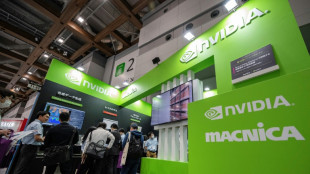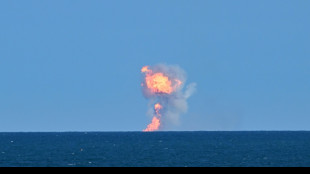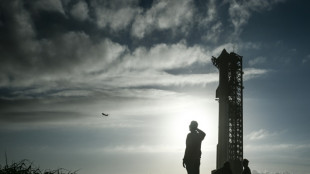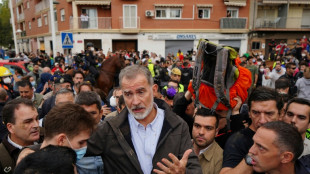
-
 General strike in Greece against cost of living
General strike in Greece against cost of living
-
Magritte painting nets auction record of $121 million

-
 Markets fluctuate as traders weigh geopolitical tensions
Markets fluctuate as traders weigh geopolitical tensions
-
Japanese, Koreans bottom of global love life survey

-
 Japan ramps up tech ambitions with $65 bn for AI, chips
Japan ramps up tech ambitions with $65 bn for AI, chips
-
Taliban govt clearing 'un-Islamic' books from Afghanistan shelves

-
 Asian markets struggle as traders weigh geopolitical tensions
Asian markets struggle as traders weigh geopolitical tensions
-
Iraq holds its first census in nearly 40 years

-
 SpaceX fails to repeat Starship booster catch, as Trump watches on
SpaceX fails to repeat Starship booster catch, as Trump watches on
-
European powers, US seek to censure Iran at UN nuclear watchdog board

-
 SpaceX fails to repeat Starship booster catch, as Trump looks on
SpaceX fails to repeat Starship booster catch, as Trump looks on
-
European stocks fall on Ukraine-Russia fears, US focused on earnings

-
 Trump names China hawk Howard Lutnick commerce secretary
Trump names China hawk Howard Lutnick commerce secretary
-
SpaceX set for Starship's next flight -- with Trump watching

-
 Top-selling daily French daily Ouest-France stops posting on X
Top-selling daily French daily Ouest-France stops posting on X
-
Russian invasion toll on environment $71 billion, Ukraine says

-
 New Botswana leader eyes cannabis, sunshine to lift economy
New Botswana leader eyes cannabis, sunshine to lift economy
-
China's Xi urges 'strategic' ties in talks with Germany's Scholz

-
 COP29 negotiators strive for deal after G20 'marching orders'
COP29 negotiators strive for deal after G20 'marching orders'
-
Walmart lifts full-year forecast after strong Q3

-
 Son of Norwegian princess arrested on suspicion of rape
Son of Norwegian princess arrested on suspicion of rape
-
US lawmaker accuses Azerbaijan in near 'assault' at COP29

-
 Spain royals to visit flood epicentre after chaotic trip: media
Spain royals to visit flood epicentre after chaotic trip: media
-
French farmers step up protests against EU-Mercosur deal

-
 Burst dike leaves Filipino farmers under water
Burst dike leaves Filipino farmers under water
-
Markets rally after US bounce as Nvidia comes into focus

-
 Crisis-hit Thyssenkrupp books another hefty annual loss
Crisis-hit Thyssenkrupp books another hefty annual loss
-
Farmers descend on London to overturn inheritance tax change

-
 Floods strike thousands of houses in northern Philippines
Floods strike thousands of houses in northern Philippines
-
SpaceX set for Starship's next flight, Trump expected to attend

-
 Several children injured in car crash at central China school
Several children injured in car crash at central China school
-
Urban mosquito sparks malaria surge in East Africa

-
 Many children injured after car crashes at central China school: state media
Many children injured after car crashes at central China school: state media
-
Asian markets rally after US bounce as Nvidia comes into focus

-
 Tens of thousands march in New Zealand Maori rights protest
Tens of thousands march in New Zealand Maori rights protest
-
Five takeaways from the G20 summit in Rio

-
 Parts of Great Barrier Reef suffer highest coral mortality on record
Parts of Great Barrier Reef suffer highest coral mortality on record
-
Defiant Lebanese harvest olives in the shadow of war

-
 Divided G20 fails to agree on climate, Ukraine
Divided G20 fails to agree on climate, Ukraine
-
Can the Trump-Musk 'bromance' last?

-
 US to call for Google to sell Chrome browser: report
US to call for Google to sell Chrome browser: report
-
Trump expected to attend next Starship rocket launch: reports

-
 Stocks, dollar hesitant as traders brace for Nvidia earnings
Stocks, dollar hesitant as traders brace for Nvidia earnings
-
Biden in 'historic' pledge for poor nations ahead of Trump return

-
 Tropical storm Sara kills four in Honduras and Nicaragua
Tropical storm Sara kills four in Honduras and Nicaragua
-
Spanish resort to ban new holiday flats in 43 neighbourhoods

-
 Phone documentary details Afghan women's struggle under Taliban govt
Phone documentary details Afghan women's struggle under Taliban govt
-
G20 wrestles with wars, 'turbulence' in run-up to Trump

-
 Stocks, dollar hesitant as traders eye US rate outlook, Nvidia
Stocks, dollar hesitant as traders eye US rate outlook, Nvidia
-
G20 wrestles with wars, climate in run-up to Trump


UK 'guinea pig' for election security before landmark votes
The UK general election is being watched closely after stark warnings that rapid advancements in cyber-tech, particularly AI, and increasing friction between major nations threaten the integrity of 2024's landmark votes.
"These rogue and unregulated technological advances pose an enormous threat to us all. They can be weaponised to discriminate, disinform and divide," the head of Amnesty International Agnes Callamard said in April.
The UK election on July 4 -- four months before the United States -- will be seen as the "guinea pig" for election security, said Bruce Snell, cyber-security strategist at US firm Qwiet AI, which uses AI to prevent cyber-attacks.
While AI has grabbed most of the headlines, more traditional cyber-attacks remain a major threat.
"It's misinformation, it's disruption of parties, it's leakage of data and attacking specific individuals," said Ram Elboim, head of cyber-security firm Sygnia and a former senior operative at Israel's 8200 cyber and intelligence unit.
State actors are expected to be the main threat, with the UK already issuing warnings about China and Russia.
"The main things are maybe to promote specific candidates or agendas," said Elboim.
"The second is creating some kind of internal instability or chaos, something that will impact the public feeling."
The UK has an advantage over the United States due to the short time period between announcing and holding the election, giving attackers little time to develop and execute plans, said Elboim.
It is also less vulnerable to attacks on election infrastructure as voting is not automated, he added.
- Deepfakes -
But hacking of institutions remains a threat, and the UK has already accused China of being behind an attack on the Electoral Commission.
"You don't have to disrupt the main voting system," explained Elboim. "For example, if you disrupt a party, their computers or a third party that affects that party, that's something that might have an impact."
Individuals are most at risk of being targeted, he added. Any embarrassing information could be used to blackmail candidates.
But it is more likely the attacker will simply leak information to shape public opinion or use the hacked account to impersonate the victim and spread misinformation.
Former Conservative party leader Iain Duncan Smith, a fierce Beijing critic, has already claimed that Chinese state actors have impersonated him online, sending fake emails to politicians around the world.
However, it is the increased scope for using AI to create and distribute misinformation that is the real unknown quantity in this year's elections, said Snell.
The spread of "deepfakes" -- fake videos, pictures or audio -- is of prime concern.
"The levels of potential for fakery are just tremendous. It's something that we definitely didn't have in the last election," said Snell, calling the UK a "guinea pig" for 2024's votes.
He highlighted software that can recreate someone's voice from a 30-second sample, and how that could be abused.
Labour's health spokesman Wes Streeting has said he was a victim of deepfake audio, in which he appeared to insult a colleague.
- Bot farms -
Snell advised authorities to focus on a "shortcut" solution of "getting awareness out there, having people understand that this is the issue".
Other software can be used to make fake pictures and videos, despite filters on many AI applications designed to prevent the depiction of real people.
"AI is, while very sophisticated, also extremely easy to fool" into creating images of real people, said Snell.
AI is also being used to create "bots", which automatically flood social media with comments to shape public opinion.
"The bots used to be really easy to spot. You'd see things like the same message being repeated and parroted by multiple accounts," said Snell.
"But with the sophistication of AI now... it's very easy to generate a bot farm that can have 1,000 bots and every one have a varying style of communication," he added.
While software already exists to check if videos and pictures have been generated using AI to a "high level of competency", they are not yet used widely enough to curb the problem.
Snell believes that the AI industry and social media firms should therefore take responsibility for curbing misinformation "because we're in a brave new world where the lawmakers have no idea what's going on".
S.F.Lacroix--CPN
